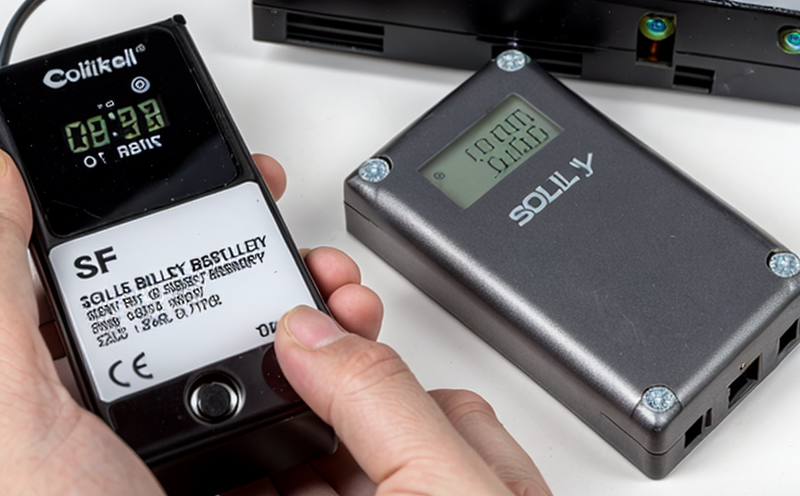IEC 62932-2-1 Solid-State Battery Testing in Flow Battery Hybrid Systems
The IEC 62932 series of standards is a critical framework for the performance, safety, and durability testing of flow batteries. Among these, IEC 62932-2-1 specifically addresses the testing requirements for solid-state battery materials in hybrid systems within flow batteries.
This standard ensures that all components of the flow battery system are rigorously tested to ensure they meet the necessary safety and performance criteria. The focus on solid-state batteries is particularly important as these batteries offer enhanced safety, higher energy density, and longer cycle life compared to their lithium-ion counterparts. This service is essential for manufacturers and researchers in the renewable energy sector who aim to develop reliable and efficient flow battery systems.
The testing process involves multiple stages that are designed to simulate real-world conditions and ensure the longevity of the system. First, the solid-state materials are subjected to various mechanical, thermal, and electrical stress tests. These tests include but are not limited to:
- Compressive strength tests
- Thermal shock testing
- Cycling tests under different temperatures and voltage ranges
- Electrochemical impedance spectroscopy (EIS) analysis
The data collected from these tests is then analyzed to ensure that the materials meet the stringent requirements set forth by IEC 62932-2-1. The results of this testing are critical for understanding the limitations and capabilities of solid-state batteries in flow battery systems.
Once the materials have passed the initial round of tests, they undergo further integration into a full-scale hybrid system. This involves assembling the battery stack with all necessary components such as pumps, storage tanks, and control systems to form a complete flow battery unit. The entire assembly is then subjected to comprehensive performance testing.
The testing criteria for this stage include:
- Maximum power output
- Energy efficiency under various load conditions
- Durability over multiple charge-discharge cycles
- Response time to changes in input voltage and flow rates
The results of these tests are used to fine-tune the system for optimal performance. This may involve adjustments to the materials, design modifications, or improvements in the control algorithms. The ultimate goal is to ensure that the hybrid flow battery system can operate reliably over long periods with minimal degradation.
Throughout this process, our laboratory adheres strictly to IEC 62932-2-1 and other relevant standards such as ISO 12103 for mechanical testing and ASTM G154 for accelerated aging tests. This ensures that the results are accurate, reliable, and internationally recognized.
The benefits of this service extend beyond just compliance with regulatory requirements. By conducting thorough testing, we help our clients:
- Identify potential issues early in the development process
- Avoid costly design modifications later in the project lifecycle
- Ensure that all components meet the highest safety and performance standards
- Gain a competitive edge by offering more reliable and efficient systems to market
The thorough testing process also enhances the reputation of our clients, as it demonstrates their commitment to quality and innovation. This is particularly important in sectors such as renewable energy where reliability and efficiency are paramount.
Industry Applications:
| Application | Description |
|---|---|
| Renewable Energy Storage | Flow batteries provide a cost-effective solution for storing large amounts of energy generated from renewable sources. |
| Grid Stability | The ability to quickly respond to changes in electricity demand makes flow batteries ideal for grid stability applications. |
| Electric Vehicles | Hybrid flow batteries can be integrated into electric vehicles to provide additional power during peak performance periods. |
| Data Centers | The high energy density of solid-state batteries makes them suitable for large-scale data center operations where space is limited. |
| Homes and Buildings | Small-scale flow battery systems can be installed in homes and buildings to provide backup power during outages. |
In conclusion, the IEC 62932-2-1 standard provides a robust framework for testing solid-state batteries in hybrid systems within flow batteries. Our laboratory ensures that all tests are conducted with precision and accuracy to deliver reliable results that meet international standards.
Benefits
The implementation of IEC 62932-2-1 Solid-State Battery Testing in Flow Battery Hybrid Systems offers several key benefits:
- Enhanced Safety: The testing ensures that all components meet the highest safety standards, reducing the risk of accidents and failures.
- Improved Performance: By identifying potential issues early in the development process, we help our clients optimize their systems for maximum performance.
- Cost Savings: Early identification of design flaws can prevent costly redesigns later in the project lifecycle.
- Compliance with Regulations: Our testing ensures that all components meet international standards, facilitating easier compliance with regulatory requirements.
- Competitive Edge: By offering reliable and efficient systems to market, our clients gain a competitive advantage.
- Reputation Enhancement: Demonstrating commitment to quality and innovation enhances the reputation of our clients in the industry.
The thorough testing process also contributes to the overall reliability and efficiency of flow battery systems. This is particularly important in sectors such as renewable energy where reliability and efficiency are paramount.





